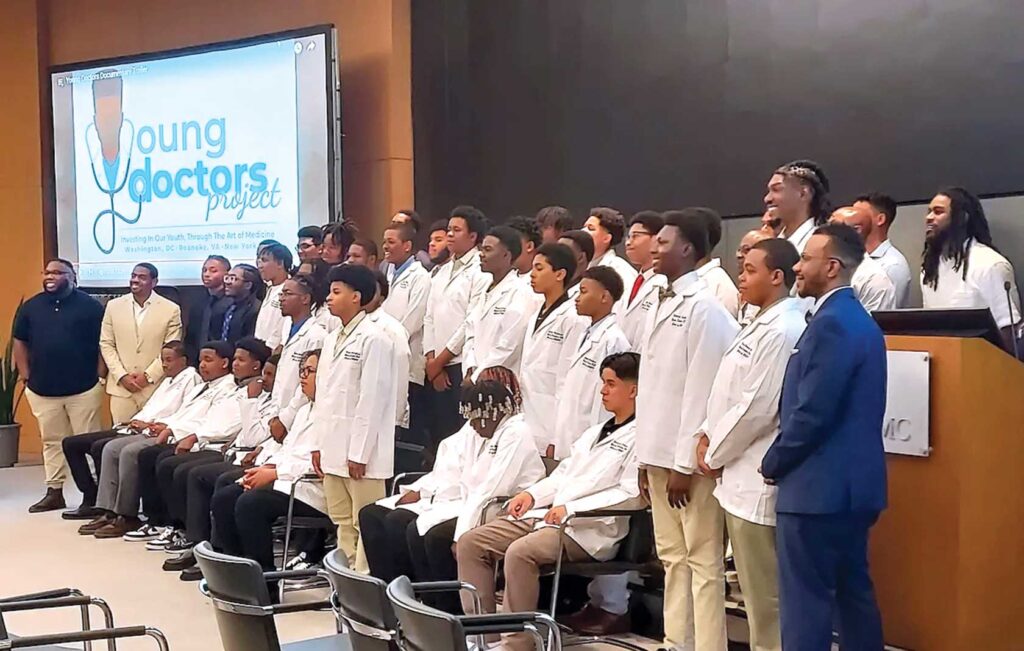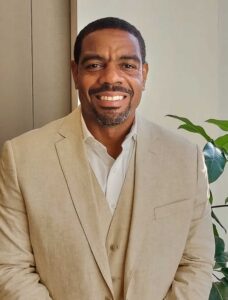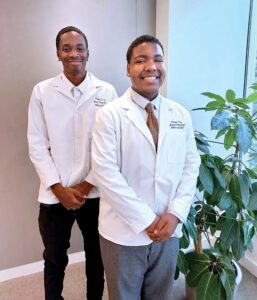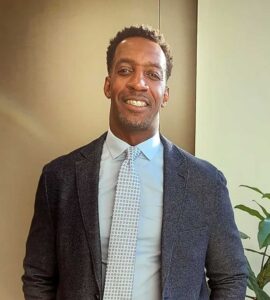White coats and brotherhood: Young Doctors Project is empowering Black youth to pursue careers in health, medicine

This summer on Howard University’s campus, there is a group of high school-aged Black youth from the DMV, Roanoke, Va., and New York City who are settling into one of the dorms for the next six weeks to learn, serve, and bond as part of a very special brotherhood.
While the program they are part of introduces these young men to careers in health and medicine, many will also pursue paths outside the medical field. What brought them all here is a vision that was set in motion 13 years ago.
Founded in 2012 in Washington, D.C., by Dr. Malcolm Woodland and Dr. Torian Easterling, the Young Doctors Project (YDP) was born out of a concern about health disparities in their communities, as well as a vested interest in mentoring young Black men. These two doctors understood the importance of having role models to show these youth pathways to futures they may have never considered.

Dr. Malcolm Woodland, co-founder of Young Doctors Project PHOTO: JULIAN B. KIGANDA/THE WASHINGTON INFORMER
“Did you know that the number one predictor of whether someone gets into medical school is if their parents are doctors? So for us, this program is about having someone in your corner who’s walked that walk,” shares Woodland. “When you have someone who has done it and can show you the pathway, life becomes so much easier. We want to expand that access for our young people and be a part of their community.”
Woodland, a licensed psychologist and graduate of Howard University, was inspired to start the program after seeing how connected the children and youth in his Anacostia community were to their elders.
“I got to thinking, our greatest asset is these children that everybody loves and knows, right? What if we turn them into health ambassadors in their neighborhoods?” he questioned.
His mission: instead of a school-to-prison pipeline, Young Doctors is creating a pipeline to education, a pipeline to medicine, a pipeline for these young people to give back to the community. Medicine is the hook, but brotherhood and service are at the heart of the mission.
“I certainly know that we can put hundreds of millions of dollars into the juvenile legal system and the criminal justice system,” he continued. “I think that money would be much better spent on organizations like the Young Doctors Project, organizations that are out here doing the work.”
Transforming Black lives
Supported by Howard University’s Department of Psychology and its Colleges of Dentistry and Medicine — along with other key partners — the program includes a six-week summer institute, Saturday academies during the school year, community health clinics led by YDP doctors, and college tours that expose students to medical schools and other educational pathways.
Kasein Tate, a graduating senior from D.C. who is headed to Morehouse College in Atlanta in the fall to fulfill his dream of becoming a cardiologist, joined the program in his freshman year of high school. His journey is a reflection of exactly what YDP was designed to do.

Young Doctors Phillip St. Vil Jr. and Kasein Tate proudly don their white coats as participants of the Young Doctors Project. PHOTO: JULIAN B. KIGANDA/THE WASHINGTON INFORMER
“I found out about the program when Dr. Woodland visited my school,” he told The Informer. “At the time, I wasn’t really sure what I wanted to do after high school. So I was like, medicine: that’s a good idea because I always liked science and math.”
Although Kasein joined the program, he was initially hesitant to open up to the other young men and mentors — something he attributes to lingering post-COVID anxiety. He credits the care, love, and support of everyone in the program with helping to bring him out of his shell and build his confidence.
That transformation came full circle on June 23 at the organization’s 13th Annual White Coat Ceremony, held at the Association of American Medical Colleges D.C. headquarters, where he was honored with the “Young Doc of the Year” Award — an accolade voted on by both his peers and mentors.
As YDP co-founder and director of education, Easterling said his commitment to the organization is renewed and deepened by what he sees during the White Coat Ceremony.
“The ceremony sells the program for everyone who comes. When we are donning the white coat on our Young Docs, folks see it. The students see it and are like ‘Oh wow. I’m going to sit up a little taller, my shoulders a bit higher.’ You see the parents as tears run down their faces,” Easterling told The Informer. “And then people will ask, ‘How do I get connected to the program? How can I be a part of it? I love what you all are doing.’”
A ripple effect
For rising high school senior, Phillip St. Vil Jr., participating in the Young Doctors Project offers appreciation from others and a heightened sense of self.
“When we go to the health fairs and they see us with our white coats on, they treat us like we’re celebrities or something,” he said. “They clap for us and come up to us asking for pictures and stuff like that. It makes me feel like I’m important.”
In addition to empowering the students, the program has an impressive 91% college enrollment rate among its participants. Yet, despite YDP’s success, Woodland still worries about the ones who don’t make it to college.
“If I’m being honest, that 9% really bothers me. How are we showing up for that 9%? The more resources we have, the more we can meet the needs of that 9% of kids who we’re still trying to work for. You know, I would love it if we said 100% of our kids. That’s what I want.”
For now, to ensure that cost would never be a barrier to opportunity, the leadership has worked hard to raise the funds needed so that the entire program is free of charge to every young man who participates. This includes covering all supplies, travel, housing, and meals.
Further, the program has attracted a dedicated group of professionals who have been inspired by its mission and the young men it serves. A native Washingtonian and board-certified cardiologist, Dr. Raymond Young joined the organization as a mentor after hearing Woodland in a radio interview.
“I’m in traffic and I hear about this program that mentors young minorities in the DMV. I heard about the activities they did: college tours as well as health fairs, and giving back to the community,” Young told The Informer. “At that point, it was almost a crime not to be affiliated, supportive, or in some way associated with the program.”

Dr. Torian Easterling, co-founder of Young Doctors Project and director of education PHOTO: JULIAN B. KIGANDA/THE WASHINGTON INFORMER
The future of Young Doctors
As the program continues to build up the next generation of Black male health professionals and changemakers, Woodland said he still has major dreams for the Young Doctors Project.
“I want it to be an institution. I want it to be a true pipeline. I want it to operate without me when I’m long gone. I want there to be a Young Doctors Project in multiple cities,” Woodland said. “It’s about brotherhood. It’s about support. It’s about creating spaces for the safe intellectual development of Black boys.”
With chapters in D.C., New York, and Roanoke, Va. — and plans underway to launch a new chapter in Seattle, Washington—that vision is becoming a reality. At this year’s White Coat Ceremony, graduates returned not just to celebrate their achievements but to give back, mentoring the next generation of Young Doctors.
As young men pursuing careers in medicine, Young Doctors Phillip and Kasein shared their final thoughts on the program and the men who have poured into them over the years.
“Thank you isn’t even enough to show the gratitude because I feel lucky to be a part of this program,” said Phillip. “There’s no other program like this in the world. I know they sacrifice a lot for this program, so it’s just a blessing.”
Kasein also lauded the work of Woodland, Easterling and other volunteers who pour into the young men through the program.
“They don’t get paid for this, and they still take time out of their summer vacation. That just shows the love and intention that they put behind the program, and that this space is somewhere safe,” Kasein said. “It’s not just people who do this because they get paid or just because it’s their job. People do it because they care about us. I’m really thankful for the intentionality they put into everything they do for us.”
To learn more about the Young Doctors Program and how you can support its mission, visit youngdoctorsdc.org.
This post appeared first on The Washington Informer.







Leave a Reply
You must be logged in to post a comment.